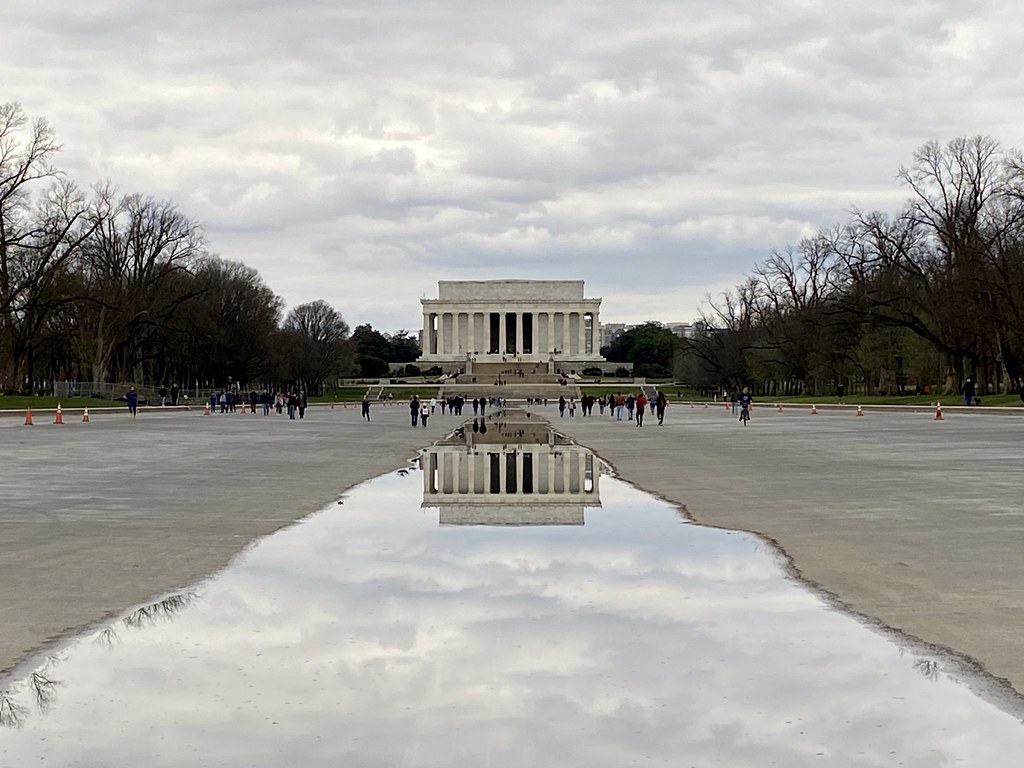Before, one of the highlights of my month was the Third Thursday #BikeDC Happy Hour. People who bike in the greater DC area would get together for beers. We just restarted the happy hour at Glen’s Garden Market in February; now it’s on hold, like everything else.
The need for companionship is still there, however, so we did the happy hour virtually on Google Hangouts. I showed up wearing a helmet. You can never be too safe, even in your own home.
Primarily, we talked about food. What grocery stores were open. Where to find fresh produce. Has anyone been able to find pasta or toilet paper?
When I bike the deserted streets of Washington, DC, I carry a bag with me, just in case I spot a store with consumer goods.
In the old Soviet Union, they called this an avoska, a luck bag. People would carry one around in the hopes that they would get lucky and find some meat or butter in the shops.
Somehow, we defeated the Soviet Union and become them. We are all Soviets now.
The shortages even extend to books. The Little Free Libraries in my neighborhood used to be overflowing with them. Now, these little book boxes have been picked clean by a desperate population eager for entertainment in a city without bars, restaurants or nightclubs.
Maybe this is a good problem. It’s forced me to read all the books that I have at home.
Goliath: The 100-Year War Between Monopoly Power and Democracy explains the economically-fucked state we’re in, where millions face unemployment, shorn off by a heartless corporate state that treats employees like serfs.
Why do they have power and you don’t? After the 1929 market crash, New Dealers curbed the power of banks and corporations, binding them with laws and regulations. The worst of the malefactors, like tax-cheat Andrew Mellon, were prosecuted while big monopolies like Alcoa (which controlled aluminum) were broken up. This was done to curb speculation and strengthen democracy.
Over time, however, the financiers were let out of their box. Free to devise new ways of fleecing the public, they engineered the 2008 credit crunch. This should’ve lead to populist reform. Instead, the banks got bailed out while the rest of us still had to pay our bills.
A couple weeks of coronavirus shutdown and the airlines are running to the government for help. Marriott just laid off most of its staff. The cruise lines demand a slice of the pie, too.
The fact that American-style capitalism can’t survive a short spell of economic turmoil without federal relief demonstrates that it’s not a sustainable system that should be preserved.
What we call capitalism in this country is a financial scheme run by the connected (like Senators with insider information) designed to benefit themselves with no obligation to anyone else. And when it fails, they walk away, leaving the rest of us to foot the bill.
We were taught that capitalism is a fair competition. The company with the best product wins. But as Matt Stoll highlights in Goliath, monopolies like Facebook, Conagra and Boeing rig the system through legal strategies and corporate lobbying to squash smaller rivals and keep consumers powerless.
Against these giants, the ordinary person – the person with the avoska looking for meat – doesn’t have a chance.
In 2008, we missed the opportunity to reform American-style capitalism to make it fairer and more equitable. Let’s not make that mistake again.
